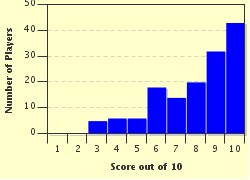Quiz Answer Key and Fun Facts
1. You may not have been at Woodstock, but if you saw the movie of that event, you will probably recall the song that came in at Number Ten in the poll of protest songs. Who recorded the anti-Vietnam protest song 'I-Feel-Like-I'm-Fixin'-To-Die Rag'?
2. Bob Dylan's first appearance in the list of the top ten protest songs, but not his last, was the 1975 song 'Hurricane', written to protest the unjust imprisonment of what man?
3. The 1969 album 'Willie and the Poor Boys' included the song that came in at Number Eight in the poll. Which group are responsible for this version of John Fogerty's song 'Fortunate Son'?
4. At Number Seven in the 2014 poll on protest songs conducted by 'Rolling Stone' was a much-covered classic protest song written and originally performed by Bob Dylan. Which of his songs opens with the line, "How many roads must a man walk down"?
5. Only one song in 'Rolling Stone' magazine's list of the top ten protest songs was not a product of the 1960s or 1970s. Who released 'Killing in the Name' in 1992 as their debut single?
6. 'Rolling Stone' magazine's poll of protest songs produced a cover of P. F. Sloane's song 'Eve of Destruction' in fifth place. Which former member of the New Christy Minstrels had a hit with this song in 1965?
7. What song placed Number Four in the 'Rolling Stone' survey of protest songs? Perhaps these lyrics will jog your memory: "Come gather 'round people / Wherever you roam / And admit that the waters / Around you have grown."
8. The Number Three song in the 'Rolling Stone' poll of protest songs was 'For What It's Worth', written by Stephen Stills in response to the first of the 'Sunset Strip riots', confrontations between hippies and police in Los Angeles that began in 1966 and continued for several years. Which band released the song in 1967?
9. Neil Young wrote 'Ohio', which ranked Number Two in the 2014 list of all-time protest songs from 'Rolling Stone', in response to what tragic event in 1970?
10. The song that topped the 2014 poll by 'Rolling Stone' of protest songs was 'Masters of War'. Who wrote and performed this song?
Source: Author
looney_tunes
This quiz was reviewed by FunTrivia editor
agony before going online.
Any errors found in FunTrivia content are routinely corrected through our feedback system.

